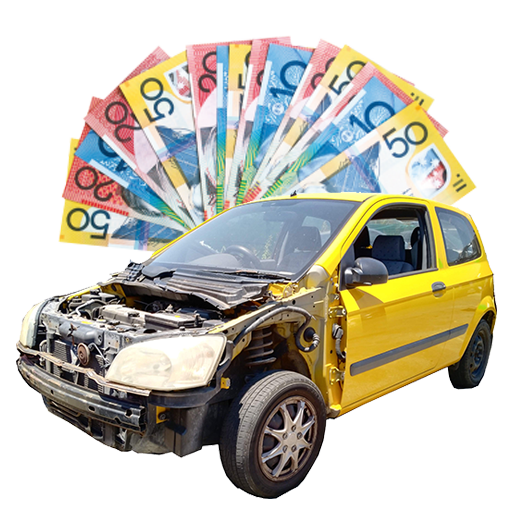So, you're wondering what that old car sitting in your driveway is actually worth? It's a common question, and the answer is a bit more involved than just plugging its details into an online calculator. While those tools are a great starting point, the final cash offer you get comes down to a few core things: its weight in scrap metal, what parts can be salvaged, and the going rate for metals.
Getting a handle on these factors is the key to making sure you get a fair price.
What Is My Junk Car Actually Worth?
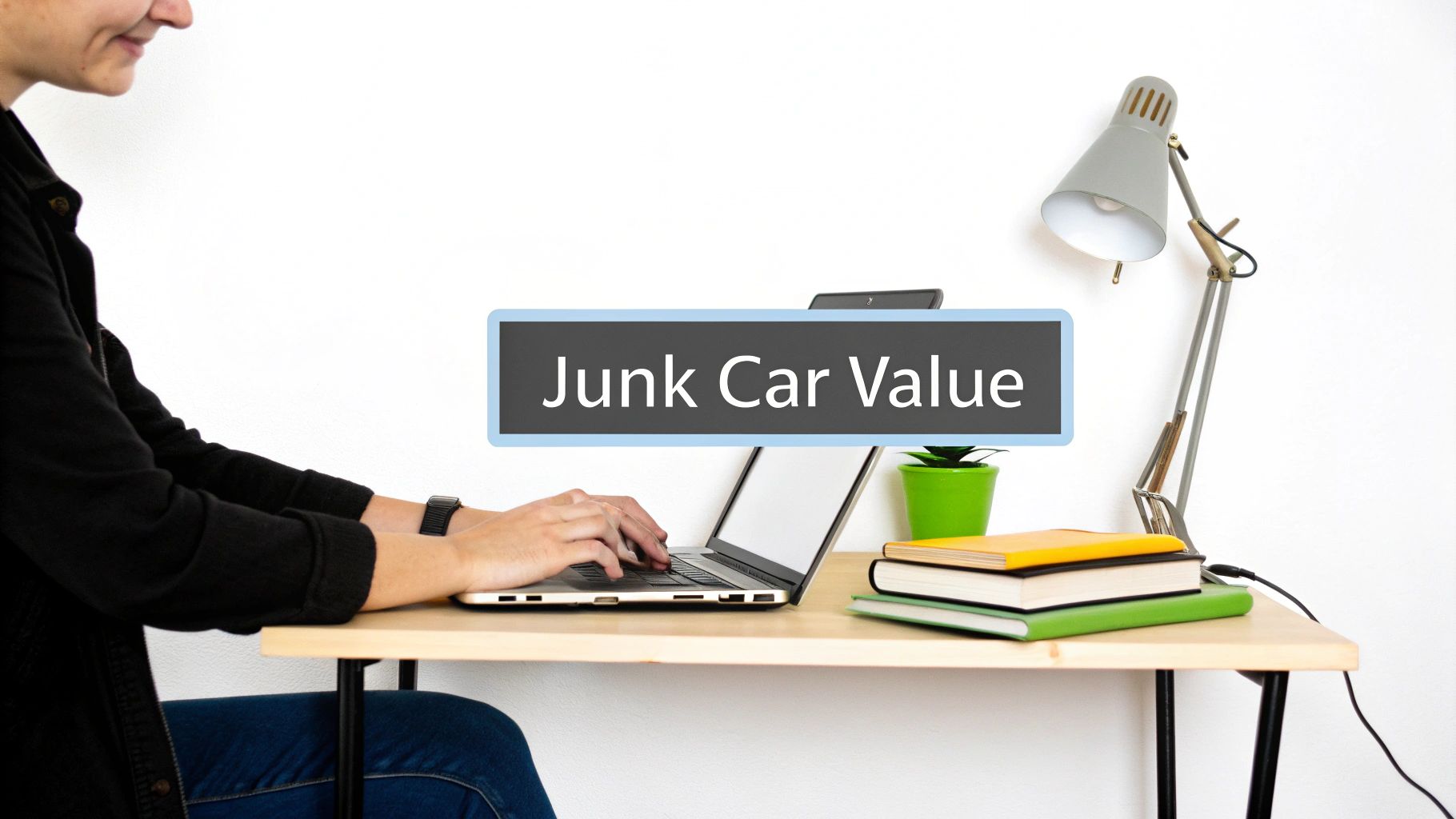
Before you even think about getting a quote, it's important to see your old car for what it really is. It’s not just a lump of metal taking up space; it's a collection of raw materials and components that all have their own market value. Any buyer, whether it's a wrecker or a private sale, is going to be doing a quick calculation of what they can get from it.
Even if the car doesn't run, the make and model still matter. Think about it: a popular model like a Toyota Corolla or a Ford Falcon likely has a high demand for its spare parts. Things like alternators, starter motors, or even body panels in decent shape can be pulled and sold.
And if you’ve got a working engine or transmission? That’s a game-changer. Those two components alone can push your car's value well beyond what you'd get for its weight in steel.
Understanding the Value Spectrum
The truth is, not all junk cars are worth the same. Their value sits on a sliding scale that depends entirely on their condition and whether they're complete.
Here in Australia, you could be looking at a value anywhere from approximately $300 to $9,000 AUD. A car that's a total write-off with no salvageable parts will naturally be at the bottom of that scale, priced purely on its scrap metal weight. On the other hand, a damaged but repairable car with valuable components will fetch a much higher price.
This table gives you a quick reference for estimated values based on a car's general condition, helping you set realistic expectations.
| Car Condition | Key Characteristics | Estimated Value Range (AUD) |
|---|---|---|
| Scrap Only | Major damage, non-running, few or no usable parts, often missing components. | $300 – $800 |
| Parts Car | Non-running but has valuable components like a good engine, transmission, or catalytic converter. | $700 – $2,500 |
| Damaged but Drivable | Can still be driven but requires significant repairs; may have cosmetic or mechanical issues. | $2,000 – $5,000+ |
| Older/Unwanted Vehicle | Runs well but is old, has high kilometres, or is simply no longer needed. | $4,000 – $9,000+ |
As you can see, the real value lies in the details. Getting a better sense of how much scrappage your car is worth often requires looking beyond just the make and model.
The biggest leap in value happens when a car goes from being just "scrap metal" to a "source for parts." A working engine, a smooth transmission, or an intact catalytic converter can easily add hundreds of dollars to an offer because wreckers know they can resell them.
Figuring out where your car fits on this spectrum is your first real step. It helps you use any online value calculator with a bit more insight and gives you the confidence you need to negotiate a fair deal. This knowledge is your best tool to ensure you don’t leave money on the table.
What Really Determines Your Scrap Car's Price?
When you punch your car's details into a junk car value calculator, it's not just guessing. It’s crunching numbers based on a few key, real-world factors that tell a car wrecker or scrap yard what your old vehicle is truly worth. Getting your head around these variables is important because they're the difference between a good offer and a great one.
The whole process is less mysterious than you might think. It's simply an honest assessment of your car's value, broken down into raw materials and any parts that can be given a second life. Let’s get into what buyers are actually looking for.
The Weight and Worth of Scrap Metal
At the end of the day, a junk car is just a big lump of metal—mostly steel, with some aluminium and other bits mixed in. The most fundamental factor setting its base value is its kerb weight. That’s how much the car weighs empty, with no people or luggage inside. Scrap yards are in the business of buying cars to recycle this metal, which they then sell on the commodities market.
Because of this, the price is always tied to the current market rate for scrap steel, which goes up and down. It stands to reason that a heavier vehicle, like an old Holden Commodore or a Ford Territory, has a higher starting value than a little Hyundai Getz. It's simple maths: more metal equals more money.
Think of your car's weight as the rock-solid foundation of its scrap value. It’s the guaranteed minimum you should expect. Everything else on top is a bonus.
Is Your Car All There?
"Is the car complete?" You'll hear this question a lot when you're after a quote. A 'complete' car has all its major bits and pieces, even if they're busted. This means things like:
- Engine and transmission
- All the doors, panels, and bumpers
- Wheels and tyres
- The catalytic converter
A car that's already been picked clean by someone looking for parts is worth a whole lot less. Why? Because the most valuable components have already walked. Even a seized engine adds weight and has value as a core for rebuilding. A missing catalytic converter is a big one—that alone can knock hundreds of dollars off an offer because of the precious metals inside it.
Salvageable Parts and Overall Nick
Now, this is where you can see the value really start to climb. The body might be a write-off, but plenty of parts inside could be perfectly fine and in high demand. If your car is a common model, wreckers are very interested in components they can pull, clean up, and sell to people fixing their own cars.
For instance, a working alternator, a straight set of alloy wheels, or even an undamaged stereo system can add real dollars to the final price, well beyond the scrap metal value. If you're keen to understand more about how this all works, our guide on how to scrap a car provides a much deeper look. The more good bits a wrecker can salvage from your vehicle, the more they're willing to pay you for it.
Working Out Your Car's Value By Hand
Sure, punching your details into a junk car value calculator is the fastest way to get a number. But knowing how to work out the figures yourself? That's your secret weapon when it comes to negotiating. When you understand the maths behind the offer, you're in the driver's seat. You’ll know a fair price when you see one and have the confidence to walk away from a low-ball offer.
Let's break down how the pros do it. It’s not as complex as you might think.
The core of a manual valuation comes down to a few key steps: figuring out the car's condition, finding its weight, and checking the going rate for scrap metal.
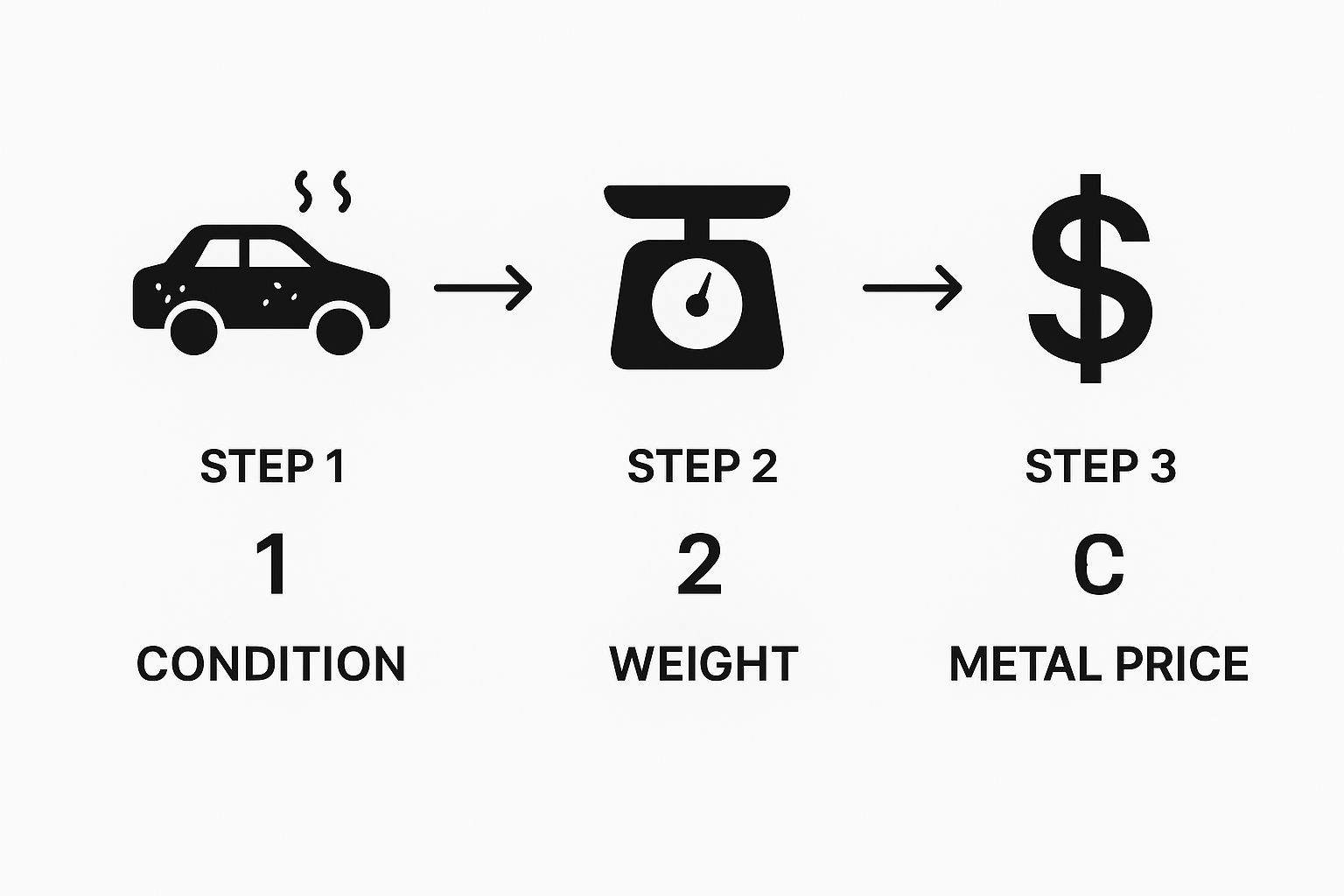
Essentially, you're finding a baseline price based on the raw materials and then adding extra value for any parts that can be salvaged and resold.
Start with the Scrap Metal Value
The absolute rock-bottom price for any junk car is what it's worth as a pile of scrap metal. This calculation is your starting point, and you only need two bits of information to figure it out.
First up, you need the kerb weight of your car. This is simply the vehicle's weight with a full tank of fuel but no passengers or luggage. The easiest way to find this is with a quick online search for your car’s make, model, and year. You'll find the figure listed in kilograms (kg).
Next, you need to find the current price for scrap steel in your area. These prices are almost always quoted per tonne (which is 1,000 kg) and they change constantly based on market demand. Try searching something like "scrap steel price per tonne Adelaide" (swapping in your city) to get a feel for current rates from local wreckers.
Let’s Run the Numbers
- Say you have a 2005 Holden Astra. Its kerb weight is roughly 1,290 kg, or 1.29 tonnes.
- You find the local scrap price is currently $250 per tonne.
- The calculation is simple: 1.29 tonnes x $250/tonne = $322.50.
- That $322.50 is your base value.
Think of this number as your safety net. Any offer below this amount is probably not a good deal, unless there are some serious towing fees involved—something you should always ask about upfront.
Tally Up the Value of Salvageable Parts
Now it’s time to build on that base value. This is where a bit of detective work can really bump up your car’s final price. You’re moving beyond seeing it as a hunk of metal and starting to see it as a collection of potentially valuable second-hand parts.
Even in a car that’s a total write-off, some components can be in surprisingly good shape and hold their value well.
Grab a notepad and list the major parts that are still working perfectly. The big-ticket items are usually:
- Engine: If it still runs and doesn’t have any catastrophic problems, it’s worth a decent amount.
- Transmission: A gearbox that shifts smoothly is always in demand.
- Catalytic Converter: This is a big one. It contains precious metals and always has a high scrap value.
- Alternator and Starter Motor: Common failure points on many cars, so there's a steady market for working used ones.
- Alloy Wheels: A clean, undamaged set of four factory alloy rims can easily fetch a few hundred dollars on their own.
To get a rough idea of their worth, jump onto online marketplaces like Gumtree or even eBay. Search for things like "used Holden Astra engine" or "Toyota Corolla transmission" to see what other people are asking.
Remember, a wrecker needs to make a profit and account for the labour of pulling the part out. So, you should realistically knock 50-70% off the prices you see online to get a wholesale estimate.
Once you add the estimated value of these parts to your base scrap metal price, you'll have a much more realistic and powerful number in your head. This final figure is the perfect benchmark to use when you start getting quotes or using an online junk car value calculator.
Using Online Calculators to Get Competitive Quotes
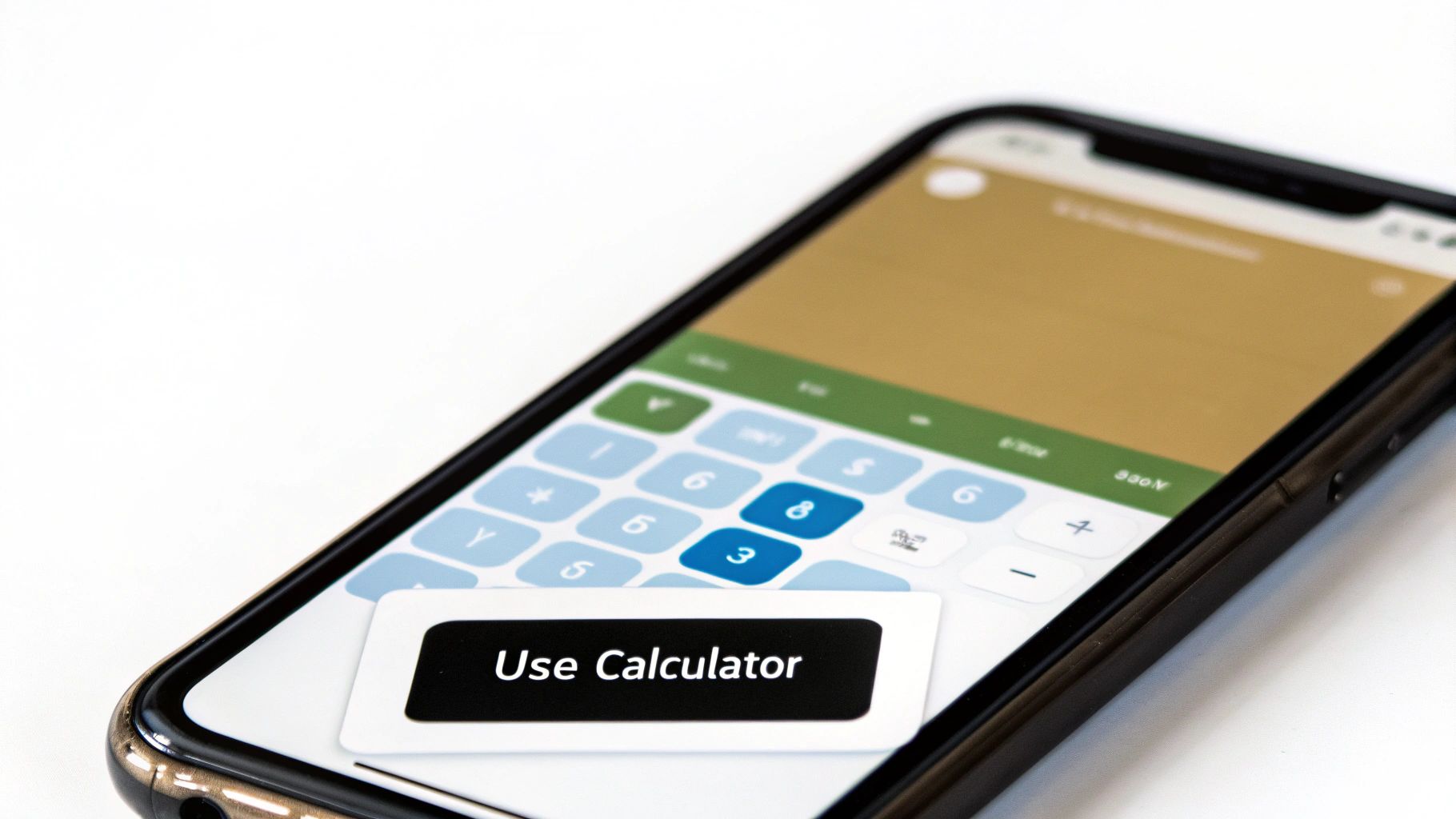
Alright, you've got a handle on what makes your old car valuable. Now it's time to turn that knowledge into actual dollars. The quickest way to get a starting figure is by using an online junk car value calculator, but there's a bit of a strategy to it. Think of it less as a price-checker and more as a tool to get buyers competing for your car.
The first step is getting an accurate baseline. When you're punching in the details on an online form, be brutally honest.
- Make, Model, and Year: The basics. Just make sure they're spot on.
- Kilometres: Don't guess. Give them the exact number on the odometer.
- Condition: This is crucial. Be upfront about every dent and scratch, but don't forget to highlight what's still good. If the engine still turns over or the interior is surprisingly clean, make sure you mention it.
Consider this first online quote your starting point. It's the floor, not the ceiling. The absolute worst thing you can do is take the first offer that comes your way.
Don't Settle for a Single Offer
To really get the most cash in your pocket, you’ve got to play the field a bit. Aim to get at least three different quotes from a few "cash for cars" buyers. It’s a simple step, but you'd be surprised how much the offers can vary for the very same car.
Just make sure you give every buyer the exact same information. That way, you’re comparing apples with apples. You might find one buyer values the specific parts in your car's model, while another is just focused on giving you a great rate for its scrap metal weight.
By gathering multiple offers, you completely change the game. You're no longer just someone trying to sell a car; you're a seller with choices, and that puts you in a much stronger negotiating position.
Thankfully, the rise of professional junk car removal services across Australia has made this whole process a lot less painful. These companies handle everything, buying vehicles 'as-is' and making sure they're recycled responsibly to minimise environmental impact. You can learn more about how these services have simplified selling junk cars in Australia and get tips to maximise your return.
Turn Your Quotes into Bargaining Chips
Here’s where you can really nudge that final price up. Once you've got your quotes lined up, take the best legitimate offer and use it. Circle back to one of the other buyers—maybe the one who seemed more professional or is located closer to you—and tell them what you’ve been offered.
It can be as simple as saying, "Look, I'd prefer to work with you, but I've got a genuine offer for $450 from someone else. Is there any chance you can match that or do a little better?"
You’ll find that many buyers are willing to bump up their price to close the deal, especially if we're only talking about a small amount. This little bit of negotiation transforms an online calculator from a simple estimator into your best tool for getting the highest possible price for your old clunker.
Common Mistakes to Avoid When Selling a Junk Car
Selling an old car should be a simple affair, but I've seen a few common missteps trip people up time and time again. These little mistakes can end up costing you real money and cause a lot of unnecessary stress. The aim here is a clean, honest sale where you walk away feeling good about the price you got.
The biggest mistake? Jumping on the first offer that comes your way. It’s easy to get tempted by a quick cash deal, but the truth is, quotes can differ massively from one buyer to the next. Taking that first offer without shopping around is like throwing money away—you have no idea if it's a fair price or just the lowest they thought they could get away with.
Not Having Your Paperwork in Order
Another classic hurdle is not having the ownership documents ready to go. Think about it from the buyer's perspective: they can't legally tow away a car and hand over cash without proof that you actually own it. Having to dig around for the title or registration papers while the tow truck waits just creates delays and can make a buyer a bit suspicious.
Before you even think about calling for quotes, get your documents sorted. You'll need:
- Proof of Ownership: This is your car's title or registration certificate.
- Proof of Identity: A valid driver's licence to show you're the person on the ownership papers.
Being prepared with this stuff from the start makes the whole process smoother and shows you’re a serious seller.
Misrepresenting Your Car's Condition
It might feel tempting to gloss over some of the car's problems, but being dishonest about its condition will always backfire. When the tow truck driver shows up, the first thing they do is inspect the vehicle. If they discover the catalytic converter you "forgot" to mention is missing, or the damage is worse than you described, you can bet they’ll drop the offer right there on the spot.
Honesty really is the best policy here. A good buyer will give you a fair quote based on what you tell them. Last-minute surprises just lead to arguments and less cash in your pocket.
Let's be realistic—the average age of a scrapped vehicle in Australia is around 18.2 years, so buyers expect them to have plenty of issues. Despite the wear and tear, scrap values have held up pretty well. In 2022, the average payout was $546 AUD, and that crept up to $560 AUD by late 2023.
One last thing to watch for is hidden towing fees. Some shady operators will give you a great price over the phone, then slash it by deducting a surprise towing charge when they arrive. Any reputable car removal service will offer free towing, no questions asked. To get the full picture, have a look at our guide on how to get the best deal when selling your car for cash in Adelaide, South Australia.
Still Have Questions About Valuing Your Car?
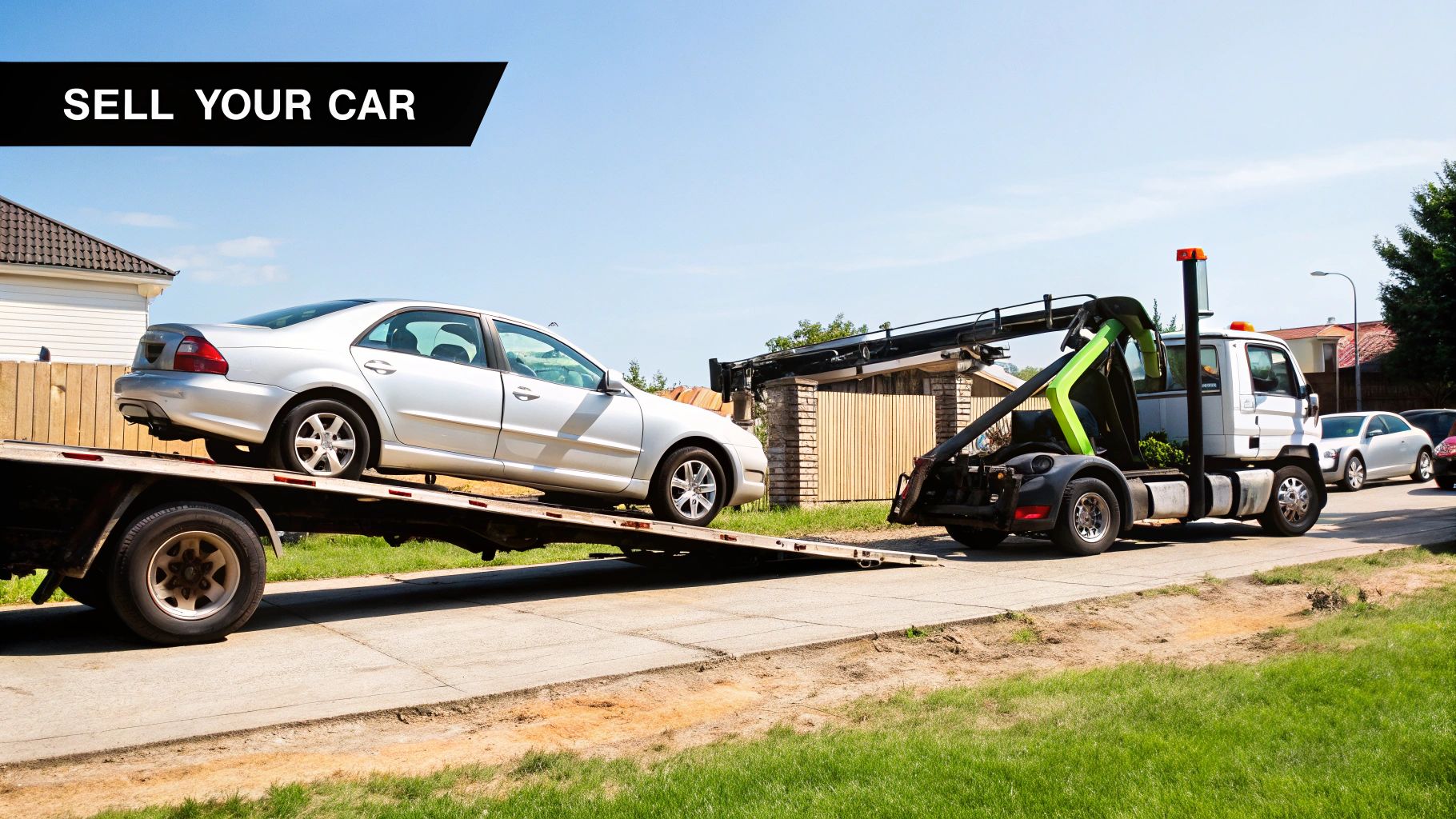
Even after using a junk car value calculator, a few lingering questions often come up just as you're getting ready to make the call. Sorting out these final details can give you the confidence you need to get the best cash offer. Let's dig into some of the most common queries we hear.
A big one is whether you can sell a car without the registration papers. While it can add an extra step, it’s usually not a deal-breaker. Reputable buyers can typically verify that you're the legal owner using other documents, like your driver's licence and the car's Vehicle Identification Number (VIN).
That said, having the rego certificate ready to go simply makes the whole process smoother and faster for everyone.
Does My Location in Australia Affect the Price?
It absolutely does. Where you are in the country plays a pretty big part in the final offer you’ll receive, and it comes down to a couple of key reasons. For one, scrap metal prices can differ between states and even major cities, directly influencing your car's baseline scrap value.
On top of that, your proximity to the buyer is a factor. If your car is parked in a remote regional town, a buyer might offer a slightly lower price to cover the higher cost of fuel and time for transport. This is different from a car located in a metro hub like Adelaide. For more local advice, our guide on how to sell your car in Adelaide dives into the specifics of the market here.
The main thing to remember is that while online calculators give you a fantastic starting point, the final, firm offer will always account for local market conditions and logistics. This is why getting a few quotes from local buyers is a non-negotiable step.
What If My Car Can't Move an Inch?
Don't sweat it—this is a situation we see all the time. Whether your car’s brakes have seized up after years of sitting idle or it’s a non-runner after an accident, professional car removal services are built for this.
They’ll show up with the right gear, usually a flatbed tow truck, to safely winch the vehicle and haul it away. No fuss, no drama. Just keep a few things in mind:
- Be Upfront: Let them know from the start that the car is a non-runner and can't be driven.
- Confirm Free Towing: Double-check that free vehicle removal is included in their offer. It should be!
- Clear the Way: Make sure there’s enough space for the tow truck to access the car without any major obstacles.
Dealing with immobile cars is business as usual for cash-for-cars companies. Its condition won't stop you from getting a fair price based on its scrap and salvageable parts.
Ready to turn that old clunker into instant cash? The team at Auto Removal Adelaide keeps things simple and profitable for you. We give top-dollar offers, provide free towing anywhere in Adelaide, and pay cash on the spot. Get your no-obligation quote today by visiting us at https://autoremovaladelaide.com.au.

